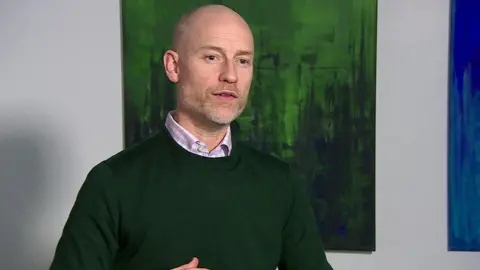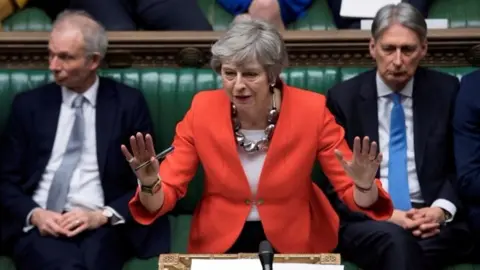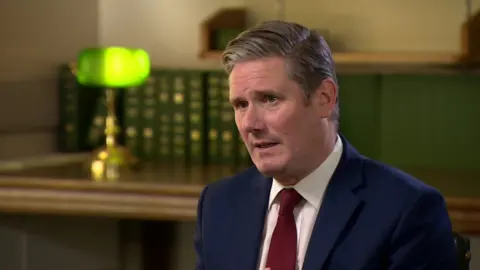Brexit: Politics 'too intolerant of compromise' - Kinnock
 BBC
BBCA lack of a Brexit compromise left politics "deeply divided and polarised," Labour MP Stephen Kinnock has said.
He said MPs could have compromised sooner, for example over Theresa May's three-times rejected Withdrawal Agreement, to avoid a "hard Brexit".
In a BBC Wales interview series, with figures from both sides of the Brexit campaign in Wales, Mr Kinnock called for a "progressive patriotism" to heal divisions.
But what would this mean in practice?
'Too intolerant'
"British political culture in general is too intolerant of compromise," said Mr Kinnock, who has served as MP for Aberavon since 2015.
"It's very much presented as a sign of weakness rather than strength. That for me is one of the big lessons of the Brexit process and how deeply divided and polarised we became."
Mr Kinnock's call for compromise is not something new.
Last year, he called for a compromised version of Theresa May's withdrawal agreement to break the Brexit deadlock under Boris Johnson's leadership.
The Withdrawal Agreement Mrs May negotiated with the EU and her political declaration, which called on the future trading relationship with the EU to be "as close as possible" and for an "ambitious customs arrangement", were defeated multiple times in the House of Commons - including by Labour MPs.
 Reuters
ReutersWith hindsight, would Mr Kinnock vote differently now?
"Given the very precarious state of Theresa May's Conservative Party and given my view that the single market is really the key to protecting the jobs and livelihoods of my constituents - at that time I felt that we should really be holding out for at least a close associate membership of the single market," Mr Kinnock said.
But comparing her deal, which he said had "many, many faults", to a "hard Brexit" on offer now, he said: "Looking back now, at the way in which the debate became incredibly polarised - yes, perhaps it would have been better to take what was on the table at the time."
Commenting after the UK and EU agreed a post-Brexit trade deal on 24 December, Mr Kinnock said he would be voting for it, adding: "This deal will create a huge amount of red tape for business, and leaves many unanswered questions in terms of protecting the UK steel industry and fighting crime."
"I'll be voting for the deal for the simple reason it provides the basic floor on which a Labour government will build a partnership between the UK and the EU that protects jobs, livelihoods and our national security."

While critical of a lack of political compromise in the past, Mr Kinnock hopes for more cross-party collaboration in the future.
Speaking before the trade deal was announced, he said: "Whatever happens there's going to be a hard Brexit, we're going to leave the single market and the customs union.
"When we see what that means for our economy, the implications for jobs and livelihoods across the entire United Kingdom - that could be an opportunity for some of the more sensible voices in the Conservative Party to work with us in the Labour Party to look at going back to the negotiating table."
'Progressive patriotism'
Having described UK politics as "divided and polarised" in the past four years - does Mr Kinnock think it's possible to change that?
"Whatever you voted on Brexit, whatever you think about the negotiations, the reality is we have burned some bridges - and we need to start being an alliance-maker rather than an alliance-breaker. And that for me is about this idea of patriotic internationalism," he said.
"We should rediscover what I call the spirit of 2012. I'm sure everyone remembers that amazing opening ceremony for the 2012 Olympics. It was such a brilliant and beautiful story about what it means to be British.
"It was the BBC, it was the NHS, it was our incredible reach as a country across the globe, it was our diversity as a country, it was our music.
"But it was done in such a positive and celebratory way. It wasn't saying 'we're better than everybody else'. It was just saying 'we are a great country with so much to be proud of'.
"Because we know that if we don't talk about patriotism, we leave the ground open to the forces of the right who turn it into nationalism and something divisive and less inclusive."
Listen to this interview, and other conversations with key figures from all sides of the Brexit debate in Wales, each morning this week on BBC Radio Wales.
